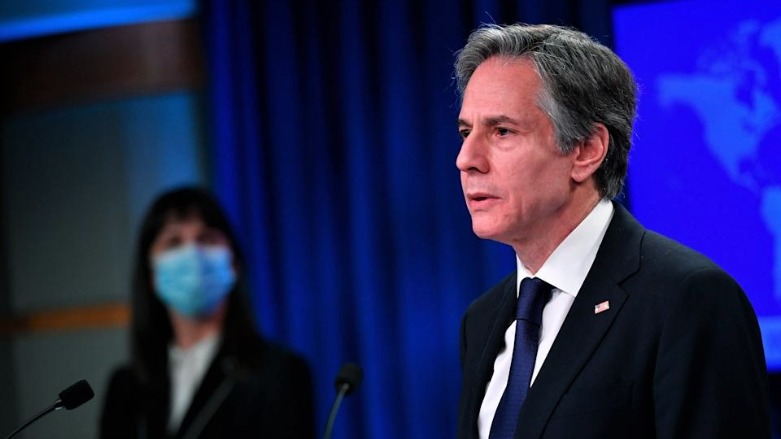US continues to refuse Iranian demand to take IRGC off terrorist list; but still says JCPOA best way to deal with Iran's nuclear program

WASHINGTON DC (Kurdistan 24) – Testifying before the Senate Foreign Relations Committee, Secretary of State Antony Blinken affirmed that a return to the 2015 Iranian nuclear deal was the best way to confront the threat posed by a potentially nuclear-armed Iran.
A revived Joint Comprehensive Plan of Action (JCPOA), the formal name of the Iranian nuclear accord, is the "best way to address the nuclear challenge posed by Iran" and "make sure that an Iran that is already acting with incredible aggression doesn't have a nuclear weapon," Blinken told lawmakers on Tuesday.
Nevertheless, Blinken stuck to a US position that may prove to be a deal-breaker. Iran has demanded that its Islamic Revolutionary Guard Corps (IRGC) be dropped from the US list of Foreign Terrorist Organizations (FTOs).
Asked directly if the Biden administration was prepared to do that, Blinken replied, "The only way that I can see it being lifted is if Iran takes steps necessary to justify the lifting of that designation."
Bipartisan Congressional Opposition to Reviving JCPOA
The revival of the JCPOA is deeply unpopular within the US Congress, as was reflected in Tuesday's hearing.
Both the Democratic Chairman of the Committee, Sen. Bob Menendez (New Jersey), and the ranking Republican, James Risch (Oklahoma), expressed strong criticism of the Biden administration's efforts to restore the agreement.
Menendez cited the long delay in reaching a new accord. The negotiations in Vienna began over a year ago. Absent an agreement, Iran is advancing its nuclear program, and there will come a point at which renewing the accord does little to restrain that program.
Menendez noted that "back in February" the Committee was told, "if there was no deal, the benefits we would receive would be dramatically diminished."
"It is now the end of April," he continued as he asked Blinken to hold an open hearing on Iran before the Memorial Day recess, which begins on May 28. Specifically, Menendez wants the Biden administration to explain what its policy on Iran will be, if no agreement is reached by that date.
Blinken agreed to the hearing, even as Menendez warned, "2022 is not 2014 or 2015." Iran has made substantial advances, while the dates on which key JCPOA restrictions expire are much closer now than they were seven years ago.
Risch was even sharper. Contradicting Blinken's claim that a renewed agreement was the least bad of US policy options, Risch affirmed that "no agreement is better than a bad agreement."
He argued that regardless of what any agreement might say, Tehran would act in its own interest, and if it were determined to acquire nuclear weapons, no agreement would stop that. Risch also noted that Israel has threatened a military response if Tehran moves close toward weaponization.
Asked later on Tuesday to expand on Blinken's remarks, State Department Spokesperson Ned Price told journalists that there were no talks scheduled on renewing the JCPOA, but "we are in close contact with the EU (European Union} coordinator who continues to convey messages back and forth," and "we remain hopeful that an agreement can be reached."
However, such an agreement "can be reached only if Iran is prepared to conclude a deal" without "raising issues that are extraneous to the JCPOA," Price continued. Presumably, he was alluding to Iran's demand that the US remove the IRGC from the FTO list.
On Monday, the spokesman for Iran's Foreign Ministry, Saeed Khatibzadeh, called for a renewal of the nuclear talks, saying Iran and the EU had agreed that "prolonging the pause in the negotiations is not in anyone's interest."
The talks in Vienna have been suspended since March 11. But like Price, Khatibzadeh said the talks "have not stopped and are continuing through the coordinator of the Vienna negotiations."
Iran's Tough Position toward the US
In other respects, Tehran has adopted a tough position toward Washington. On Tuesday, Iran's Supreme Leader, Ayatollah Ali Khamenei, spoke with a group of university students in Tehran.
"The US is getting weaker day by day–from within, in its domestic policies, in its foreign policies, in its economy and in its security," Khamenei told the students. "Today, the world is on the threshold of a new world order: a new international order against the previous monopolar and bipolar world."
Presumably, Khamenei envisages a world in which Iran enjoys more freedom of action and has more significant influence in international affairs.
In addition, China's Defense Minister arrived in Tehran on Wednesday for discussions with the Iranian leadership.
